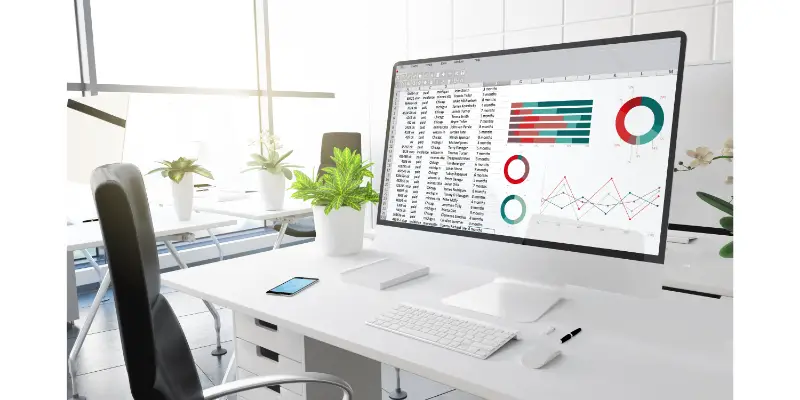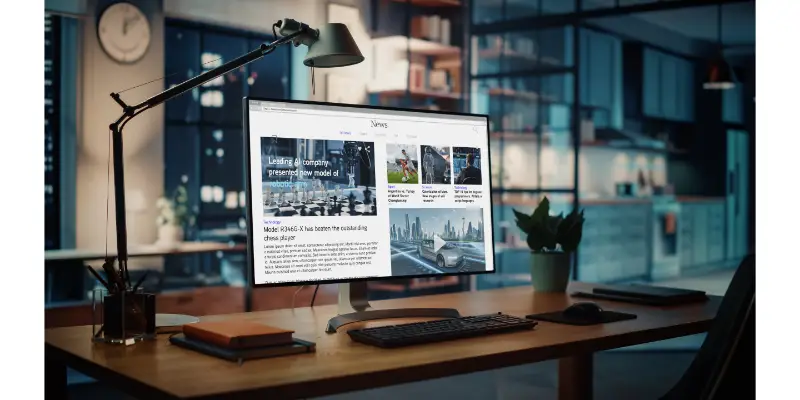Disclaimer: This post may contain affiliate links, meaning we get a small commission if you make a purchase through our links, at no cost to you. For more information, please visit our Disclaimer Page.
When it comes to computers, the two most common types of computers for all-around computing are the laptop and the desktop. While many people are now using smartphones and tablets for computing, the laptop and the desktops are still unbeatable when it comes to their all-around uses. That said, as popular as both the laptop and the desktop still are amidst the rise of technology, what makes these computers similar and different from one another?
Essentially, the laptop and the desktop are capable of doing the same functions, and that is where they are similar. However, in terms of form factor, size, portability, and power requirements, among others, there are also plenty of differences between the laptop and the desktop.
As similar as the laptop and the desktop are in terms of what they can do, you still cannot disregard the fact that they are still different in a lot of other aspects. And this is where some people are led to the choice of choosing only one over the other instead of owning both a laptop and a desktop.
That said, let’s look at the similarities and differences of these two computers so that you will understand which machine is the right one for you.
Table of Contents
Are desktop and laptop computers the same?
Computers are now commonplace in today’s modern world, as basically everyone in the world has one but in different forms. The reason we are saying that is that almost everyone in the world has a conventional computer or a smart device that can also function similarly to the traditional computer.
Yet, when it comes to the daily demands of everyday life, such as the things you do for work, business, or play, the conventional computer still stands out. And there are two types of computers that belong to the traditional forms of computers: the laptop and the desktop.
While mobile devices are becoming more popular nowadays thanks to the advancements of modern technology, we still regard the laptop and the desktop as the kings of the computing world because of how they can be used for a wider variety of purposes. In a sense, they are better when it comes to their all-around purposes as laptops and desktops can basically do everything you can ask a computer to do.
So, as popular as laptops and desktops may be, why do we classify them into different categories? Are desktops and laptops computers the same or are they entirely different machines? This is an important question to ask because we need to know for certain which of the two computers best fits our daily lives and demands.
Basically speaking, both the laptop and the desktop are pretty much similar in what they can do because anything that the desktop can do from a computing standpoint can also be done on a laptop of the same power. That said, these two computers are, from the utilitarian and functionality standpoints, essentially the same. So, if that is the case, why are we even classifying them as different machines?
Well, the answer is simple. We classify laptops and desktops as different computers from one another precisely because they are also quite different regardless of how similar they may be in a lot of other aspects.
As much as we would like to say that they are the same machines in terms of what they can do functionality-wise, they are also quite different in how they can be used and in how they are designed and built. That’s why laptops and desktops are actually the same but still very much different from one another.
Because of how different laptops and desktops can be from one another, it is no wonder why people usually choose only one over the other instead of owning both of them. You can’t say the same when it comes to mobile devices because most people own a mobile device and a laptop or a desktop.
However, not a lot of people own both a laptop and a desktop because of the differences between the two machines and how such differences allow a person to choose which of the two is the better choice for him.
That said, for us to understand what makes a laptop similar yet different from a desktop, we will look at its similarities and differences in greater detail.
What are the similarities between a laptop and a desktop computer?
Before we get to answer which between a laptop and a desktop is better for you, let us first discuss their similarities so that you will know what makes these two computers essentially the same in terms of their functionality.
Similar required parts and components
The first similarity that you should know about laptops and desktops is that they actually require the same components for them to work properly. And we are talking about the internal and external components in this regard. But while they may have similar parts and components requirements, you should still know that doesn’t mean that such parts and components aren’t interchangeable.
Instead, what we are referring to here is that laptops and desktops essentially require the same parts to function even though such parts may come in different forms and sizes. As such, this is just the same as how one house may be similar to another house in terms of what they need to stand upright and to function well enough as a house but such requirements just come in different forms and sizes.
That said, laptops and desktops both require the same internal components such as the CPU, RAM, and storage drive to function.
Meanwhile, such parts are put together and allowed to work well through the motherboard, which should be found on both a laptop and a desktop. While such parts may be different in terms of their appearances and in how they work, they are essentially the same when it comes to what they do for the laptop or the desktop.
Meanwhile, the external components are also the same because both the laptop and the desktop need a display, a keyboard, and a mouse to actually work properly. Again, such components just appear different from one another but their purposes are basically the same.
They have similar purposes
On top of how laptops and desktops require the same components to work, they also have the same purposes in the sense that there are no differences in how you use a laptop and a desktop. Technically, what a desktop can do from a functionality standpoint can also be done by a laptop as long as they are similar in terms of their power and specs.
That said, when someone is using a laptop, he can be using it for work, leisure, or play. But the fact of the matter is that all those things can also be done on a desktop without any differences in terms of how you do them. That’s because you can still watch the same movies and play the same games on both the laptop and the desktop albeit there might be performance differences depending on their specs. But, all else held constant, they are essentially the same in terms of their purposes.
However, the difference in their purposes may come in the form of how they are being used. A good case in point is how laptops are being used as portable machines that you can bring to a coffee shop or use inside a plane for work or leisure. While a desktop can also be used for work or leisure, you probably won’t be able to use it inside a coffee shop or an airplane. In the same way, a desktop usually also outperforms its laptop counterparts even though they can essentially do the same functions.
No differences in operating systems
There are no differences between a laptop and a desktop in terms of their operating systems because they both run the same operating systems as long as we are talking about specific operating systems.
For example, the Windows OS that a desktop is running is no different from the one that a laptop is running because Windows does not make specific operating systems for desktops or for laptops unless we are talking about touchscreen-enabled laptops.
In that regard, the same OS that you install on your desktop is the same OS you install on your laptop. There are no differences between them. However, in the past, there were differences in their performances because some laptops cannot handle 64-bit operating systems due to their weaker processors.
But, today, there are technically no differences in the OS of both laptops and desktops as long as they come from the same manufacturer.
The apps and programs are the same
Similar to how both the laptop and the desktop use the same operating systems, these computers are also the same in terms of the apps and programs that you can install in them. That’s because apps and programs don’t differentiate whether it is a laptop or a desktop that is running them as long as these computers are capable enough to run such software.
What are the differences between a laptop and a desktop computer?
As mentioned, regardless of how similar a laptop is to a desktop, there are still plenty of differences that allow both of these computers to be entirely different machines. Let us look at the most common differences between them.
Form Factor
The moment you look at a laptop and a desktop, you will immediately see the differences between them in terms of their form factor. This is where their differences will stand out and start to stem from.
First of all, the laptop was meant to be an all-in-one computer that is portable enough in the sense that its display, keyboard, and touchpad are all integrated together with the entire computer. It has a clamshell form factor that is meant to open and close conveniently.
On the other hand, a desktop is made to be a home-use machine that has a separate case for its internal components and needs external peripherals such as a monitor, a keyboard, and a mouse to work properly.
Portability
Of course, because of how different they are in terms of their form factor, portability now becomes a major difference between a laptop and a desktop. For one, only the laptop is the portable machine between the two.
The laptop is made to be portable thanks to its clamshell form factor and how it can function on a battery even though it isn’t plugged into a constant supply of power. On top of that, laptops are made to be light, slim, and complete in all of their peripherals so that you are basically carrying only one machine when you need to use a computer on the go.
Meanwhile, even though desktops are now slimmer and lighter than ever before, they still aren’t portable enough that you can carry them wherever you go. That’s because desktops require several external peripherals to work properly. On top of that, a desktop needs to be connected to a constant supply of power so that it can actually function.
Performance
In terms of performance, there is no arguing against the fact that laptops and desktops just aren’t the same. That’s because laptops and desktops, even though they have the same parts and components, are still different in what their parts and components are capable of.
Due to the very fact that laptops are smaller and slimmer, their parts and components aren’t quite powerful compared to a desktop since the focus in designing these parts is to make sure that they fit the laptop and will not eat a lot of power.
On the other hand, the very fact that desktops have bigger parts that are capable of handling more power allows them to perform better than laptops. So, when you compare the two side by side, desktops simply are just more powerful than laptops.
Power requirements
As mentioned, laptops and desktops also have different power requirements thanks to how their components are made and designed to be different.
A laptop, for instance, should have parts and components that are not only small and slim enough but also don’t eat up a ton of power so that they won’t end up draining a laptop’s battery quickly. This is why, aside from how big desktop components are, you cannot use most desktop parts for your laptop.
Meanwhile, power requirements really aren’t an issue for desktop computers because their parts can have a near-unlimited source of power considering that desktops are connected to a constant power source. This is also one of the reasons why desktops are simply better than laptops in terms of their overall performance.
Costs
Finally, let us now look at the costs you will incur when buying a laptop or a desktop.
When you look at these machines, laptops might have a lower price floor compared to desktops because it is easy to find entry-level laptops that may be between $300 to $500. On the other hand, it would be very difficult to find a desktop that comes at such prices.
However, as you go up the performance ladder, you will begin to see how desktops are actually more affordable compared to laptops in terms of how you view their specs and performance. For example, a $1,000 desktop will surely be more powerful than a $1,000 laptop. And this is because desktops can afford to have more affordable parts considering that it is easier to manufacture such parts compared to the smaller and slimmer parts you see in laptops.
What are the advantages of laptops over desktops?
While they may be similar and different from one another, laptops and desktops also have their own distinct advantages over one another. Let us first look at where the laptop trumps over the desktop.
First of all, laptops are made to be portable and easy to carry around. As such, in terms of their convenience, laptops are much more convenient than desktops considering that you can simply carry them around without having to connect them to a constant power source or bring several peripherals.
Second, laptops also trump over desktops in terms of how you no longer have to buy separate parts and peripherals. All you need to do is to go to a computer store and then buy a laptop for you to have an entirely complete computer. We cannot say the same for a desktop because a lot of people need to buy desktop peripherals separately.
Third, you won’t have to worry about power outages because you can always use your laptop’s battery in case the power goes out. This means that you won’t end up losing valuable work time or productivity in case the power goes out while you are working on your laptop.
Finally, a laptop is less power-intensive compared to a desktop thanks in large part to how laptops don’t eat up a ton of power. This can be great for those who want to save up their power expenses as laptops do not require the same power that desktop computers do.
What are the advantages of a desktop over a laptop?
Now that we know where the laptop trumps over the desktop, it’s time for us to look at the advantages of a desktop over a laptop.
For one, desktops are essentially more powerful than laptops due in large part to how they have parts and components that are bigger and much more capable of producing more output. This is why hardcore gamers often prefer desktops to laptops.
Another advantage that desktops have over laptops is in terms of costs. As mentioned, desktops are cheaper when you compare them to a laptop with similar specs. Again, this is due to how desktops have parts that are cheaper to manufacture. On top of that, thanks to how upgradeable desktops are, the costs of owning one might be cheaper in the long run.
Speaking of upgradeability, the fact that a desktop can be upgraded is also an advantage. If one part of your desktop has become obsolete, you can simply swap it out for a newer and more powerful one. This isn’t something that you can do with a laptop.
Which is better a laptop or a desktop?
All that said, which between a desktop or a laptop is the better option for you? Should you go for a laptop, which is portable and easier to carry and use? Or should you go for a desktop, which provides more power and long-run savings?
The truth is that it depends on how you use them.
Those who are always on the go and would need a computer that they can use for work or play at any given moment should benefit more from a laptop. Laptops are simply the more convenient of the two options you have here.
On the other hand, those who are often at home and are more likely to work in a home or an office setup will benefit more from a desktop. Meanwhile, hardcore gamers will also most likely prefer a desktop because of the performance advantage it has over a laptop.
Still, if you can, why not go for both? After all, both these machines have benefits that you can take advantage of at any given moment.
Conclusion
The truth is that there is no one computer that is better than the other because both the laptop and the desktop have their own specific purposes. While they may be similar in a lot of aspects, they are also quite different from one another. But their differences don’t dictate which one is better for you because it still boils down to your preferences and needs.
However, if you can actually afford both a laptop and a desktop, there is no one stopping you from getting both. If you do that, you won’t have to be torn between them and you will also be able to take advantage of both worlds.





